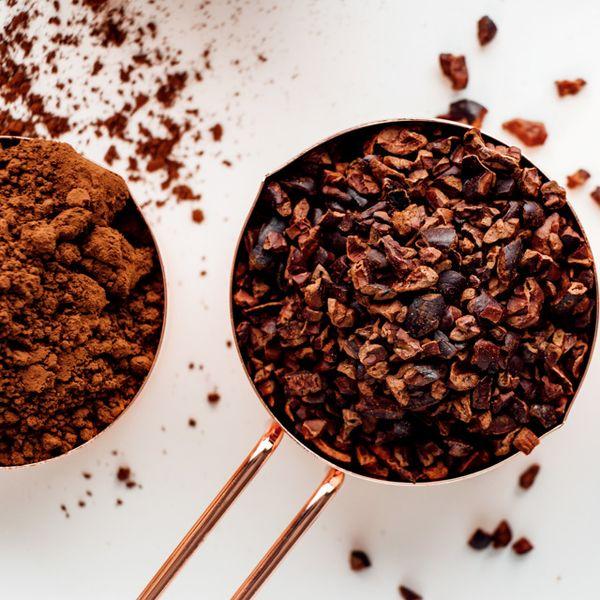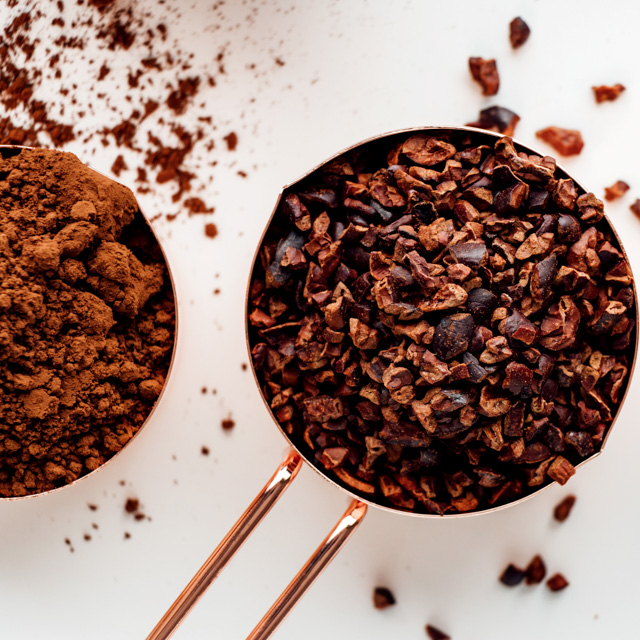Who doesn't love chocolate? It's smooth and creamy and undeniably one of life’s simple pleasures.
But for some, chocolate is more than a tasty treat—it's a health and wellness aid that boasts some surprising benefits, including beauty benefits for your hair, skin and beyond.
Chocolate also has quite a few other perks, including support for healthy cholesterol levels already within the normal range, cognitive function and giving your body a substantial antioxidant infusion.
Sound too good to be true? Grab a bag of chocolate cacao nibs and get ready to discover the fantastic health and wellness benefits of chocolate.

Chocolate is a Source of Certain Nutrients
Before we get into the specific health benefits of chocolate, let’s take a quick glance at some of the common nutrients in both milk and dark chocolate. Both deliver protein, potassium, calcium and a lot of other goodness.
Milk Chocolate Per 25g
- 1.91 g protein
- 14.85 g carbohydrates
- .59 mg iron
- 52 mg phosphorus
- 93 mg potassium
- 47 mg calcium
Milk chocolate also contains 134 calories and 7.42 grams of fat per serving.
Dark Chocolate (70-85% cacao solids) per 25g
- 1.95 g protein
- 11.47 g carbohydrates
- 2.98 mg iron
- 57 mg magnesium
- 77 mg phosphorus
- 179 mg potassium
- 18 mg calcium
Dark chocolate with 70-85% cacao solids also contains 150 calories and 10.66 grams of fat.
Delivers Free Radical-Neutralizing Antioxidants
Every time you take a bite of chocolate, you’re giving your body something it needs: antioxidants. According to one study, chocolate contains more antioxidant flavonoids and polyphenols than fruit juice.1 Polyphenols are particularly good at promoting the neutralization of free radicals within the body, which can lead to damage like oxidization and potential health concerns if left unchecked.
Supports Heart Health
Go ahead, sip on an occasional cup of hot cocoa or break off a corner of that chocolate bar because you might just be doing your heart a favor. That’s right, studies have shown that the antioxidants found within chocolate may help support the protection of the arteries from free radical damage and oxidization.2
Furthermore, studies have looked at the antioxidant flavonoids within chocolate and the role they may play in supporting healthy levels of lipoprotein (LDL) oxidation.3
Boosts Brain Function
If your brain needs a boost, chocolate can help. Researchers have conducted a number of studies on the effects of chocolate on the mind, and the results have been positive. For example, one study found that individuals given high-flavonol cocoa for a period of five days exhibited signs of increased blood flow to the brain.4
Further studies on the effect of chocolate on the brain showed cognitive-boosting benefits for elderly chocolate consumers. One, in particular, found that chocolate consumption boosted cognitive function in adults from the ages of 70-74.5
We also can’t overlook the fact that chocolate is filled with energy-enhancing stimulants. These stimulants include caffeine and theobromine, which play a role in promoting improved brain function in the short term, while also boosting a healthy mood.6
Promotes Healthy Blood Pressure Already Within the Normal Range
Chocolate has taken the spotlight in a wide array of scientific studies for its intriguing ability to support healthy blood pressure levels already within the normal range. These studies include white chocolate, polyphenol-rich dark chocolate and milk chocolate and researchers have come to some very intriguing conclusions.
One 8-week study reported that individuals taking high polyphenol dark chocolate showed that it significantly promoted healthy blood pressure levels vs. the same 25 g dose of white chocolate.7
Another study took a close look at the polyphenol activity in chocolate and found that it has been shown to have an inhibitory effect on specific enzymes, which can support healthy blood pressure.8
A third study reported that the flavonoid content may play a role in supporting cellular function within the arteries, leading to support for healthy blood pressure within the normal range.9
Promotes Healthy Cholesterol Levels Already Within the Normal Range
There’s good cholesterol, known as high-density lipoprotein (HDL), and bad cholesterol, which is low-density lipoprotein (LDL). While LDL makes up a large portion of the cholesterol in your body, high levels of it can raise serious concerns for your health. HDL, meanwhile, is essential for supporting lower cholesterol.
By incorporating chocolate into their routine, researchers believe that individuals may be able to help promote healthy cholesterol levels within the normal range. Some studies have shown that the plant sterols and cocoa flavonoids in dark chocolate were effective in supporting healthy levels of LDL cholesterol.10
Beauty-Boosting Benefits of Chocolate
Since health and beauty often go hand-in-hand, it’s no surprise that a health booster like chocolate may also enhance your appearance. Here are four ways in which chocolate helps up your beauty game.
Offers Antioxidant Protection
The same antioxidant flavanols in chocolate that give you some of the health-boosting benefits mentioned above may also support healthy skin. Antioxidants help protect against oxidative damage caused by harmful free radicals and environmental factors while helping fight signs of skin aging.11
Supports Skin Hydration
Chocolate is a source of vitamins and minerals that impart some skin-boosting benefits, and it may also help support skin hydration. Further studies are needed, but there is at least some research that seems to show that chocolate supplementation can potentially boost collagen health as well as skin elasticity and hydration.12, 13
Offers Stress Relief
The effects of daily stress can impact your appearance and your health in general. Whether it’s puffy skin under your eyes, poor digestion or the many other ways stress can affect how you look and feel, chocolate may have a role in helping fight stress. It can help promote a decrease in stress levels by supporting the inhibition of stress hormones.14 Plus, the magnesium content within chocolate is also helpful since magnesium is a well-known mood booster with stress-fighting benefits of its own.15 Read Magnesium for Mood, Anxiousness and Stress to learn more.
Promotes Healthy Hair & Scalp
Did you know dark chocolate also supports the health of your hair, making it look shiny and voluminous? This delicious treat can help your illustrious locks look their best. That’s because there are many minerals within chocolate that are excellent for nourishing hair health, each in their own unique way.
Take, for example, iron, which is vital to promoting oxygen transport to your cells. In some studies, iron deficiency has been linked to hair loss.16 Zinc, meanwhile, is essential for supporting tissue growth and repair. Proper zinc intake, according to studies, may boost hair growth and overall health.17
Discover first-hand the health-boosting power of chocolate with chocolate cacao nibs. Make sure to sign up for Swanson Health Emails to get expert advice and our best promotions delivered straight to your inbox.

About Lindsey Toth, MS, RD
Registered Dietitian, Swanson Health Products
Lindsey is a nationally recognized registered dietitian and nutritionist with a soft spot for pie. She empowers people to take charge of their health by finding the balance between the pleasure and nourishment in food.
Her philosophy is that you should take care of your body because it’s the only permanent home you have. It’s what inspired her to pursue a career in nutrition and, ultimately, led her to Swanson Health.
Sources
1 BioMed Central. 10 February 2011. https://www.sciencedaily.com/releases/2011/02/110207073748.htm
2 Vlachopoulos, et al. Curr Hypertens Rep. 2006 Jun; 8(3):205-11. US National Library of Medicine National Institutes of Health. https://www.ncbi.nlm.nih.gov/pubmed/17147918
3 Kwok CS, Boekholdt SM, Lentjes MAH, et al Heart 2015;101:1279-1287. https://heart.bmj.com/content/101/16/1279
4 Francis, et al. J Cardiovasc Pharmacol. 2006; 47 Suppl 2:S215-20. US National Library of Medicine National Institutes of Health. https://www.ncbi.nlm.nih.gov/pubmed/16794461
5 Eha, et al. The Journal of Nutrition, Volume 139, Issue 1, January 2009, Pages 120–127. https://academic.oup.com/jn/article/139/1/120/4750870
6 Smit, et al. Psychopharmacology (Berl). 2004 Nov; 176(3-4):412-9. Epub 2004 May 5. US National Library of Medicine National Institutes of Health. https://www.ncbi.nlm.nih.gov/pubmed/15549276
7 Rostami, et al. ARYA Atheroscler. 2015 Jan; 11(1):21-9.Polyphenol-Rich. US National Library of Medicine National Institutes of Health. https://www.ncbi.nlm.nih.gov/pubmed/26089927
8 Murillo, et al. Curr Pharm Des. 2017;23(17):2444-2452. doi: 10.2174/1381612823666170329144307. US National Library of Medicine National Institutes of Health. https://www.ncbi.nlm.nih.gov/pubmed/28356040
9 d'El-Rei, et al. Int J Hypertens. 2013;2013:985087. doi: 10.1155/2013/985087. Epub 2013 Mar 5. US National Library of Medicine National Institutes of Health. https://www.ncbi.nlm.nih.gov/pubmed/23533716
10 Allen, et al. J Nutr. 2008 Apr; 138(4):725-31. US National Library of Medicine National Institutes of Health. https://www.ncbi.nlm.nih.gov/pubmed/18356327
11 Fernández-García, et al. 2014 Sep; 5(9):1994-2003. doi: 10.1039/c4fo00280f. US National Library of Medicine National Institutes of Health. https://www.ncbi.nlm.nih.gov/pubmed/24964816
12 Scapagnini, et al. Nutrients > v.6(8); 2014 Aug > PMC4145303. US National Library of Medicine National Institutes of Health. https://www.ncbi.nlm.nih.gov/pmc/articles/PMC4145303/
13 Mogollon, et al. Nutr J > v.13; 2014 > PMC4082621. US National Library of Medicine National Institutes of Health. https://www.ncbi.nlm.nih.gov/pmc/articles/PMC4082621/
14 Sunni, et al. Int J Health Sci (Qassim) > v.8(4); 2014 Oct > PMC4350893. US National Library of Medicine National Institutes of Health. https://www.ncbi.nlm.nih.gov/pmc/articles/PMC4350893/
15 10 Evidence-Based Health Benefits of Magnesium. https://www.healthline.com/nutrition/10-proven-magnesium-benefits#section3
16 Shrivastava, SB. Indian J Dermatol Venereol Leprol. 2009 Jan-Feb; 75(1):20-7; quiz 27-8. US National Library of Medicine National Institutes of Health. https://www.ncbi.nlm.nih.gov/pubmed/19172026
17 Yanagisawa, Zasshi. 2008 Mar; 128(3):333-9. US National Library of Medicine National Institutes of Health. https://www.ncbi.nlm.nih.gov/pubmed/18311051
Updated February 17, 2022
*These statements have not been evaluated by the Food and Drug Administration. These products are not intended to diagnose, treat, cure or prevent any disease.




